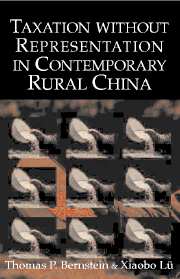Book contents
- Frontmatter
- Contents
- List of Journals, Newspapers, Translation Services, and Abbreviations
- List of Tables and Figures
- Preface
- 1 Introduction
- 2 Peasants and Taxation in Historical Perspective
- 3 Extracting Funds from the Peasants
- 4 Institutional Sources of Informal Tax Burdens
- 5 Burdens and Resistance: Peasant Collective Action
- 6 Containing Burdens: Change and Persistence
- 7 Burden Reduction: Village Democratization and Farmer National Interest Representation
- 8 Conclusions
- Bibliography
- Index
8 - Conclusions
Published online by Cambridge University Press: 13 July 2009
- Frontmatter
- Contents
- List of Journals, Newspapers, Translation Services, and Abbreviations
- List of Tables and Figures
- Preface
- 1 Introduction
- 2 Peasants and Taxation in Historical Perspective
- 3 Extracting Funds from the Peasants
- 4 Institutional Sources of Informal Tax Burdens
- 5 Burdens and Resistance: Peasant Collective Action
- 6 Containing Burdens: Change and Persistence
- 7 Burden Reduction: Village Democratization and Farmer National Interest Representation
- 8 Conclusions
- Bibliography
- Index
Summary
NEARLY a century ago, Schumpeter wrote in his treatise on the relationship between the state and taxation: “Taxes not only helped to create the state. They helped to form it. The tax system was the organ the development of which entailed the other organs…. The tax brings money and calculating spirit into corners in which they do not dwell as yet, and thus becomes a formative factor in the very organism which has developed it.” The study of peasant burdens and rural taxation in China offers a glimpse into the direction in which Chinese reforms have been evolving. This conclusion recapitulates major empirical findings and discusses their theoretical import.
The Three Rural Chinas. Our first major finding is that to understand the complexities of the countryside, it is essential to differentiate between “industrializing rural China,” middle-income “agricultural China,” and low-income western China. China's unitary state designed policies at the Center for the entire country. Although lip service was paid to the principle of implementing policies according to local circumstances (yin di zhi yi), in fact performance demands on localities seem to have been quite uniform. (There were some exceptions, such as Tibet.) With regard to the rural sector, this greatly contributed to increased regional differentiation with respect to development. Policies of fiscal decentralization allowed localities to retain more revenues and thereby stimulate development. This worked well in some parts of the country but not so well in others.
- Type
- Chapter
- Information
- Taxation without Representation in Contemporary Rural China , pp. 241 - 252Publisher: Cambridge University PressPrint publication year: 2003



